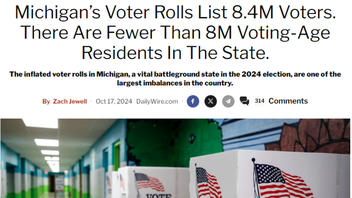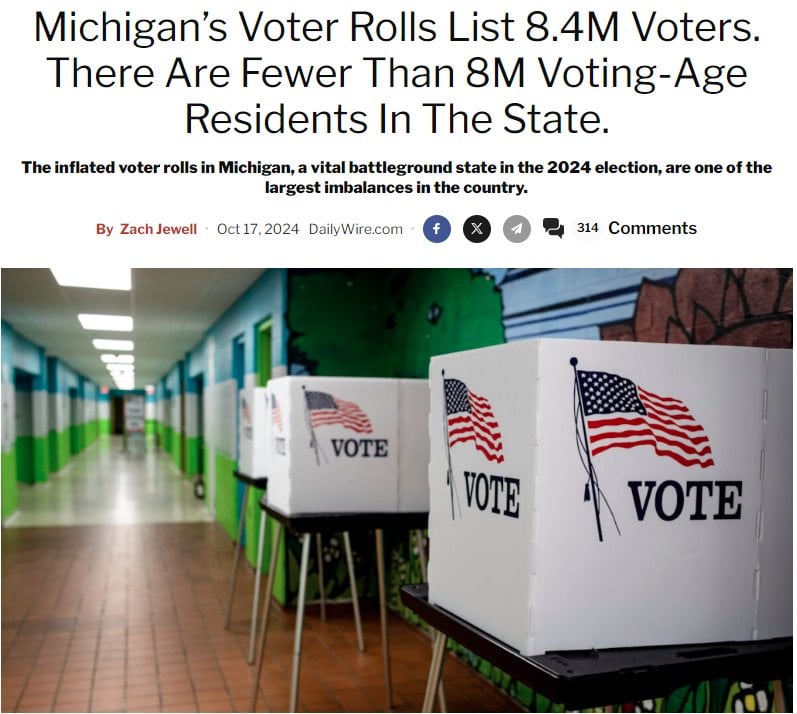Fact Check: Michigan’s Active Voter Count NOT 8.4 Million, Closer To 7.2 Million, Inactive Registrations Included By Law

Do Michigan’s voter rolls list 8.4 million voters who can cast a ballot, when there are fewer than 8 million voting-age residents in the state? No, that’s not true: 8.4 million does not accurately reflect the number of active registered voters. After removing inactive or canceled voter registrations, there are approximately 7.2 million active registered voters in Michigan, according to the Michigan Department of State.
The claim appeared in an article (archived here) published by The Daily Wire on October 17, 2024, and titled “Michigan’s Voter Rolls List 8.4M Voters. There Are Fewer Than 8M Voting-Age Residents In The State.” The story started:
Around 8.4 million people are registered to vote in Michigan, but that’s nearly 500,000 more people than the total number of voting-age residents in the state.
This is what the article looked like on The Daily Wire at the time of writing:
(Source: X screenshot taken on Mon Oct 21 15:36:25 2024 UTC)
The numbers presented are accurate but don’t indicate that anything nefarious is going on, either.
The U.S. Census Bureau (archived here) estimates Michigan’s voting-age population at about 7.9 million, while the Michigan Department of State’s Michigan Voter Information Center (archived here), which updates its figures daily, puts the number of registered Michigan voters at more than 8.4 million.
Michigan’s Election Fact Center
Asked for a response to the allegation that Michigan has more registered voters than voting-age residents, Samantha May, press secretary for the Michigan Department of State, directed Lead Stories to the Secretary of State’s Election Fact Center (archived here) in an October 21, 2024, email. The website said, “Michigan has approximately 7.2 million active registered voters and a voting age population of approximately 7.9 million.” The key phrase in the sentence is “active registered voters.”
The Election Fact Center’s explanation continued:
Michigan’s voter rolls are maintained in accordance with state and federal law. Michigan’s list of registered voters is maintained on the Qualified Voter File (QVF), a database developed by the state of Michigan and maintained by municipal and county clerks and the Bureau of Elections. The QVF contains the name of every person registered to vote in Michigan. It also contains the names of voters with cancelled registrations who are no longer eligible to vote in Michigan. The QVF is constantly updated whenever a new voter registers, a voter updates his or her registration information (such as an address), or a voter’s registration is cancelled.
The page cites four main reasons why someone’s voter registration can be canceled:
- A voter relocates outside their voting district.
- A voter passes away.
- A voter registration is found to be a duplicate.
- A voter requests to cancel their registration.
Removing someone from the voting rolls must follow state and federal laws and doesn’t happen immediately. The process takes several years, according to the Election Fact Center (emphasis theirs):
When election mail (such as a voter information card or absent voter ballot application) sent to a voter by a clerk is returned by the U.S. Postal Service as undeliverable, clerks use this as initial information that the voter may have moved. The clerk sends a notice of cancellation to the voter’s address in Michigan. If the voter does not respond and does not have any voting activity by the second even-year federal election following the notice, the voter’s registration is cancelled. State and federal law require voters who are inactive because they may have moved to stay on the rolls until the 2-federal cycle waiting period has passed – a period of time that could be up to four years.
The Michigan Department of State says that, since 2019, election officials have canceled over 800,000 voter registrations and identified more than 600,000 that will be canceled in 2025 and 2027 after the required two federal election cycles have passed. Until then, these names will remain on the voter list. While they are registered voters, they’re not “active registered voters.”
Still, there are other reasons a name might remain on the voter rolls, according to the Election Fact Center:
There are additional inactive registrations in QVF that may belong to voters who have died or moved, but election officials cannot take steps to cancel these registrations unless they receive affirmative information showing they have died or moved. Legislation has been proposed to create additional ways for election officials to identify, notify, and eventually cancel inactive voters under Michigan law.
The waiting period is necessary because initial information indicating that someone has moved may not accurately reflect their voting residency. For instance, a person might change their address for reasons like a temporary job, school or military service but still wish to vote in Michigan, as allowed by law.
In all cases, voters are only allowed to cast a ballot once in each election.
Read more
Additional Lead Stories fact checks on claims related to the 2024 U.S. general election and other elections are here.



